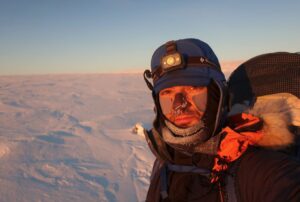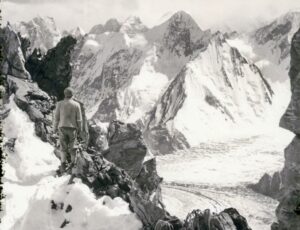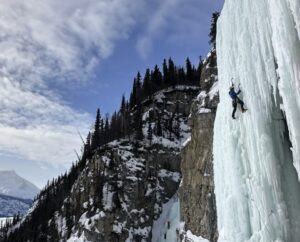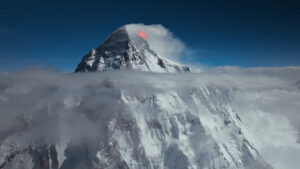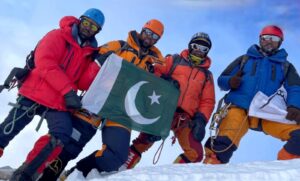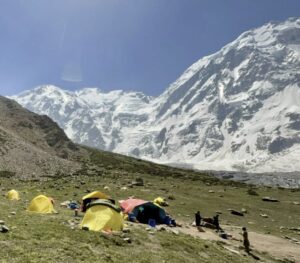Before 2005, only a few climbers had climbed K2 in August before. That summer, a new set of climbers tried their luck.
A team from the Kazakh army was the last to arrive at Base Camp.
Ordered to K2
It was a sudden decision for the Kazakh army team. The climbers had only a week to prepare and reach Pakistan.

The 2005 Kazakh team. Photo: Russianclimb
The Kazakh team consisted of four strong young climbers: Maxut Zhumayev, Damir Molgachev, Vassily Pivtsov, and Sergey Brodsky. Their coach, Ervand Iljinsky, accompanied them. On August 1, they arrived at Base Camp.
There, they met some of the other teams on the mountain and decided to join forces.
A short weather window
On August 4, three days after arriving in Base Camp, the Kazakhs established Camp 2 at 6,700m.
They wanted to take advantage of a short weather window forecast between August 13 and August 16. During the previous weeks, bad weather had forced long waits. Some groups even decided to end their expeditions after many weeks on hold.

K2, the second-highest mountain on Earth — steeper, more technical, and deadlier than Everest. Photo: Oswald Rodrigo Pereira
The summit push
On August 13 at 5:58 am, the Kazakh team sent an SMS to Base Camp, saying that the sun was shining somewhere ahead and that they were going to climb up from Camp 2. After 12 hours, they reached Camp 3 (7,350m) and checked in to say that the weather was okay and that the wind was below them.
The following afternoon, they reached Camp 4 (7,900m). They planned to start their final summit push at midnight. The Kazakhs, Polish climbers Anna Czerwinska and Darek Zaluski, and a Hungarian team including Zsolt Eross, chose to make the push despite deteriorating weather. Back in Base Camp, the leader of the mixed Central European team, Lajos Kollar, spoke of “decreasing chances, increasing determination.”
The last message
At 11:24 pm, the Kazakh team confirmed that they were starting their summit push under a sky filled with stars. This was the last message from the Kazakh team before the battery on their satellite phone ran out.

A starry night over K2.
Meanwhile, in the higher camps
Hungarian climber Zsolt Eross started his summit push two hours later than the Kazakhs but turned around at 8,250m, from the Bottleneck. Eross reported waist-deep snow. Likewise, Cerwinska and Zaluski retreated to Camp 4. During this time, the weather worsened and the wind speed climbed, reaching 100kph.
Nevertheless, the Kazakhs pressed on, taking turns to break trail. Eventually, two of their quartet, Zhumayev and Molgachev, decided to turn around as well. But Pivtsov and Brodsky continued on toward the summit.

The Bottleneck on K2 and the Great Serac. Photo: Valentyn Sypavin
So close, yet so far
At 7 pm, Pivtsov and Brodsky reached 8,500m.
Unfortunately, they had run out of time. “Broad Peak stood opposite us and we saw that the top was already at sunset. We worked almost 24 hours from tent to tent that day,” Brodsky told Russianclimb afterward.
The two decided that they had to descend. It was a painful decision, but the shadows on the nearby mountains meant that they would not reach the top before nightfall. As always, they were climbing without O2, and to push on was too risky.

The Bottleneck. Photo: Adrian Ballinger
Pivtsov descended ahead of Brodsky. They were still above Camp 4 and it was already dark. When Brodsky caught up with Pivtsov, he found Pivtsov in a bad state. He was almost blind from the wind and flying ice spicules. They were now both in imminent danger.
Disoriented, they couldn’t find Camp 4. “However, we were not afraid to descend… [We] dreamed of reaching the tent. Come on! We chose such a life,” Brodsky recalls thinking.
Finally, they found Camp 4 and were able to descend with the other climbers to Camp 3. On August 17 at 9:30 pm, they staggered into Base Camp. If it had been just a little colder, the two Kazakhs would have frozen to death high on K2.

Another view of the Great Serac over the Bottleneck, 300m above the Shoulder, and Camp 4. Photo: Ralf Dujmovits
One more try?
But the Kazakhs did not give up. Before arriving at Base Camp, they had left all their climbing gear at Advanced Base Camp, in case of a second attempt.
On August 23, while the other groups packed up and headed home, the Kazakhs set off again up the mountain. However, their gear was nowhere to be found. All their equipment had been stolen, including their crampons. The Kazakhs would not get another crack at the summit.

The upper slopes of K2, viewed from a helicopter. Photo: Chhang Dawa Sherpa

